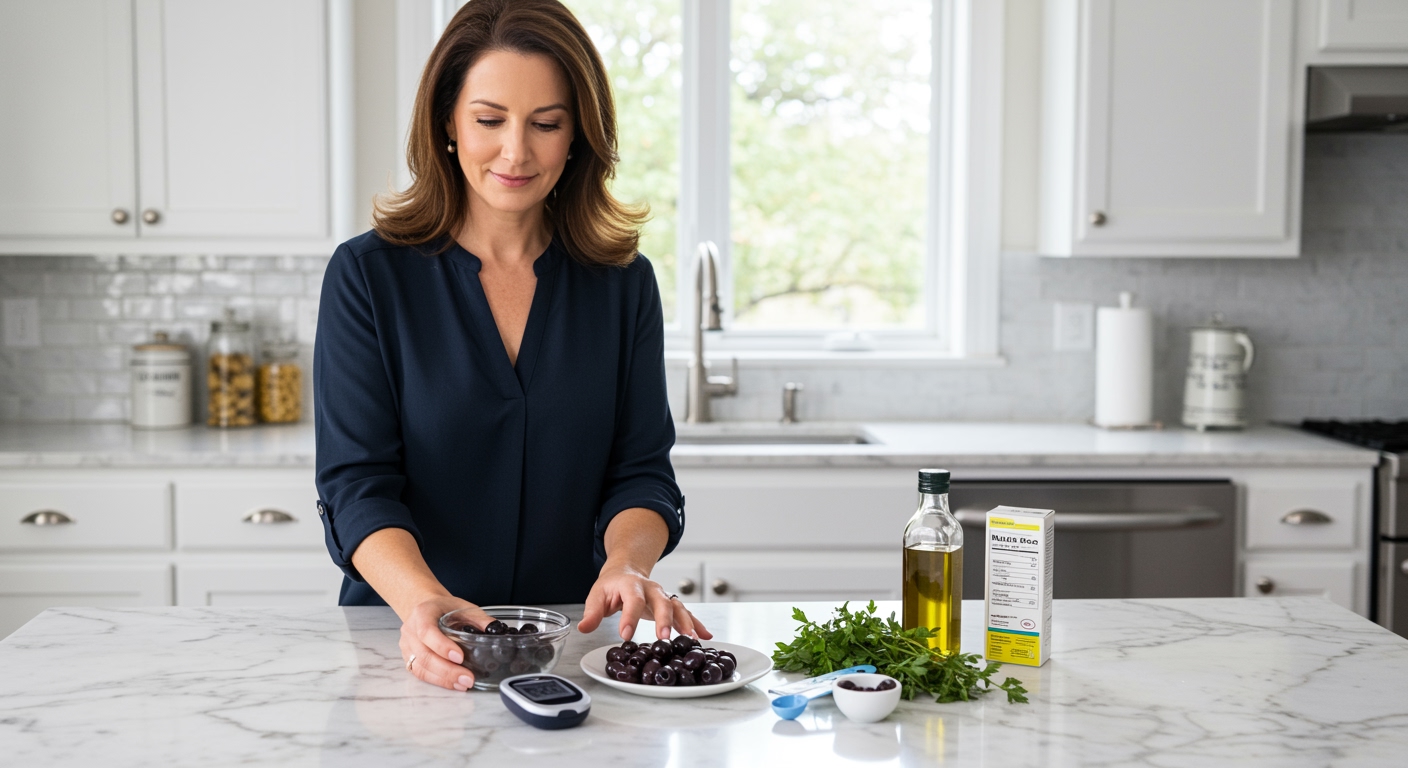✪ Key Takeaway: Black olives are excellent for diabetes with zero glycemic index and healthy fats that help stabilize blood sugar levels.
Introduction
You reach for that jar of black olives in your pantry, then pause.
Your diabetes diagnosis has made you question every food choice, and you wonder if these Mediterranean favorites will spike your blood sugar or help control it.
Hi, I’m Abdur, your nutrition coach, and today I’m going to explain exactly how black olives affect your blood sugar and why they might be one of the best snacks for diabetes management.
Do Black Olives Raise Blood Sugar Levels?
Black olives have a glycemic index of zero, which means they do not raise your blood sugar at all.
This happens because black olives contain virtually no carbohydrates – only about 0.5 grams per 10 olives.
Your body breaks down carbohydrates into glucose, which enters your bloodstream and raises blood sugar levels.
Since black olives are primarily composed of healthy monounsaturated fats and water, they bypass this glucose conversion process entirely.
The fiber content in black olives, though small at 0.5 grams per serving, actually helps slow down the absorption of any other carbohydrates you eat with them.
This makes black olives not just neutral for blood sugar, but potentially beneficial for glucose control when eaten as part of a balanced meal.
✪ Fact: Black olives contain less than 1 gram of carbohydrates per 10-olive serving, making them virtually carb-free.
What Makes Black Olives Diabetes-Friendly?
The monounsaturated fat content in black olives provides multiple benefits for people with diabetes.
These healthy fats help improve insulin sensitivity, which means your body can use insulin more effectively to manage blood sugar.
Black olives also contain powerful antioxidants like vitamin E and polyphenols that fight inflammation in your body.
Chronic inflammation interferes with insulin function, so reducing it through antioxidant-rich foods like black olives supports better glucose metabolism.
The sodium content in black olives, while something to monitor, can actually help maintain proper electrolyte balance when consumed in moderation.
This is particularly important for people with diabetes who may experience fluctuations in fluid balance due to blood sugar changes.
✪ Pro Tip: Rinse canned black olives under cold water to reduce sodium content by up to 40 percent.
How Many Black Olives Can Diabetics Eat Daily?
A safe and beneficial serving size for diabetics is 10 to 15 black olives per day.
This portion provides about 50 calories and delivers the health benefits without excessive sodium intake.
The portion control matters more for sodium management than blood sugar concerns, since black olives won’t spike glucose regardless of quantity.
However, eating too many can contribute to high blood pressure, which often accompanies diabetes and creates additional cardiovascular risks.
You can spread this serving throughout the day – add 5 olives to your morning salad and 10 more as an afternoon snack.
The steady intake of healthy fats from black olives can help maintain stable energy levels and prevent the blood sugar dips that trigger unhealthy food cravings.
✪ Note: People with kidney disease should limit black olives due to their potassium content.
When Should Diabetics Eat Black Olives?
The best time to eat black olives is before or with meals that contain carbohydrates.
The healthy fats in black olives slow down gastric emptying, which means food moves more slowly from your stomach to your small intestine.
This slower digestion process leads to more gradual glucose absorption and prevents sharp blood sugar spikes after meals.
Eating black olives as a mid-afternoon snack can also help prevent the energy crashes that often occur between lunch and dinner.
The combination of healthy fats and minimal carbohydrates provides sustained energy without triggering insulin responses.
Avoid eating black olives late at night, as the sodium content might contribute to fluid retention and disrupt sleep quality.
✪ Pro Tip: Pair black olives with raw vegetables to create a satisfying, blood sugar-friendly snack combination.
Are There Any Risks For Diabetics?
The primary concern with black olives for diabetics is their high sodium content, not their effect on blood sugar.
Most commercially prepared black olives contain 200-300 mg of sodium per 10-olive serving, which can contribute to high blood pressure.
People with diabetes already face increased risks of cardiovascular disease, so managing sodium intake becomes crucial for overall health.
Some individuals may experience digestive discomfort from the natural compounds in olives, particularly if they have sensitive stomachs.
The fat content, while healthy, is still calorie-dense at about 5 calories per olive, so overconsumption can contribute to weight gain.
Weight management remains important for diabetes control, as excess weight can worsen insulin resistance and make blood sugar management more difficult.
✪ Note: Choose low-sodium varieties when available, or rinse regular olives to reduce sodium content.
The Bottom Line
Black olives are not just safe for diabetics – they are actually beneficial for blood sugar management and overall health.
The best foods for diabetes are often the simplest ones that work with your body, not against it, and black olives perfectly demonstrate this principle with their zero glycemic impact and blood sugar-stabilizing properties.
I would love to hear about your experience with black olives and diabetes management, so please share your questions, success stories, or concerns in the comments below.
References
At NutritionCrown, we use quality and credible sources to ensure our content is accurate and trustworthy. Below are the sources referenced in creating this article:
- Rupa Health: Are Olives Good for Diabetics
- Glycemic Index Net: Black Olives Glycemic Index
- PMC: Olive Oil and Diabetes Prevention
- January AI: Black Olives Glycemic Index





